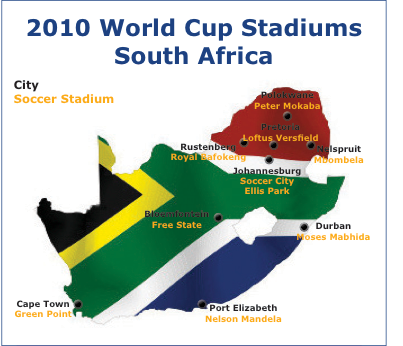June 1st, 2012
South Africa has spent billions on preparations for the World Cup – effectively, a 30-day advert for the country. But for how long will this portrait survive after the last whistle has been blown?
by Cassandra Tanti
“Events like the 2010 World Cup act as a marketing opportunity to showcase South Africa to the world. With over 200 countries watching, a successfully hosted event is likely to improve the country’s international image, enhance national identity and pride, and reduce Afro-pessimism”. Player and Referee: Conflicting Interests and the FIFA World Cup
But what’s on the other side of hosting a World Cup? According to a controversial new book released forty-days prior to the world’s most prestigious tournament, it’s ultimately FIFA and the corrupt heavyweights who benefit from this mega-event, and not the host nation and it’s taxpaying citizens.
Player and Referee: Conflicting Interests and the FIFA World Cup, published by the Institute for Security Studies (ISS), investigates a string of alleged ‘wheeling and dealing’ strategies behind the approaching 2010 World Cup in South Africa. It details six case studies, written by award-winning investigative journalists from South Africa and the UK. They provide a stark contrast between the stated goals of bringing the World Cup to Africa for the first time – enhancing national identity and raising the international profile of the continent’s most developed nation – and the potential for corruption that accompanies such a huge event.
“If corruption is defined as the abuse of public office for private gain then, in my opinion, FIFA has created a model of institutionalised global corruption.” Andrew Jennings, journalist.
Allegations of corruption and secrecy against FIFA are nothing new, but apply these latest accusations to a nation that has been described as the most unequal country on the planet, and perhaps the consequences are greater than ever before.
Player and Referee makes the following allegations and criticisms:
- FIFA “strong-armed” Cape Town officials to build Green Point stadium. It cost R3 billion more than the two alternatives, there was no pre-existing need for the stadium and it will probably become a white elephant.
- The cost of erecting soccer stadiums for a once-off event exceed the benefits for local communities, and the long-term financial viability of several stadiums remains questionable.
- Match Event Services, the official hotel and ticketing provider, was awarded its contract by FIFA without public bidding. It marked up room costs by 30% and is controlled by a British family, meaning a “large chunk” of the profits from hotel accommodation will not stay in South Africa.
- One of the shareholders of Match Hospitality, which has exclusive rights to offer hospitality packages to corporate clients, is the FIFA president’s nephew.
- An impact assessment of the World Cup on South Africa’s domestic economy stated “FIFA is the major beneficiary, while South Africa carries a disproportionate share of the cost burden”.
The 2010 World Cup is estimated to generate an income of between $3.2 and $4 billion for FIFA. In addition, all revenues from television ($2 billion), marketing ($1 billion), hospitality ($120 million) and licensing ($80 million) go to FIFA and its local organising committee. The South African event is projected as the largest of all World Cups thus far, generating more revenue than any other before it. South Africa has paid out $5 billion getting the Rainbow Nation ready, while FIFA has spent $1.1 billion.
The benefits of this kind of government investment are undeniable – the infrastructure projects generate lucrative construction and other related tendering contracts, often financed by host nations and their governments. Organising Committee CEO Danny Jordaan insists the World Cup will leave South Africa with “more than a few” new stadiums, new roads, rail and bus networks together with the airport terminals and hotels. Plus, there is the innovation and development of the nation’s broadcasting and technology infrastructure.
But such investment also allows ample opportunity for corruption, bribery, fraud and extortion. According to the authors of Player and Referee, there seems to have been very little in the form of competitive bidding for lucrative stadium construction contracts in South Africa. Meanwhile, the steel industry is suspected of price-fixing, resulting in significant cost increases in the building of arenas and other infrastructure. The Competition Commission is currently undertaking its own investigation of these allegations.
It is a story not too dissimilar to that of the 2006 FIFA World Cup in Germany, where the president of the Allianz stadium and his son were convicted of receiving bribes worth over 3 million euros, in exchange for contracts linked to revamping the venue.
There may always be corrupt, opportunistic heavyweights involved in mega-events such as the World Cup. But when a country that still struggles to provide housing, electricity and running water in many parts, is faced with a taxpayer bill of R17.4 billion (as opposed to the estimated R2.3 billion), then such exploitation is simply unacceptable. Transparency and fairness should be demanded at the highest levels and FIFA, with its roots in the “public good”, should be giving more to the communities from which is taking. In response to the billions of dollars in profit FIFA is set to gain from the 2010 World Cup, secretary general Jerome Valcke has this to say…
“Yes, it’s a lot of money, but just to be clear, we are not sitting on profit, all the money is going back into football.”
And here I was thinking that reducing poverty, providing housing, AIDS relief and education would all be worthy of a share of the profits! I’m sorry FIFA, but giving an impoverished community a stadium and a football is simply not enough.
Source: That’s Nice Magazine


Leave a Reply